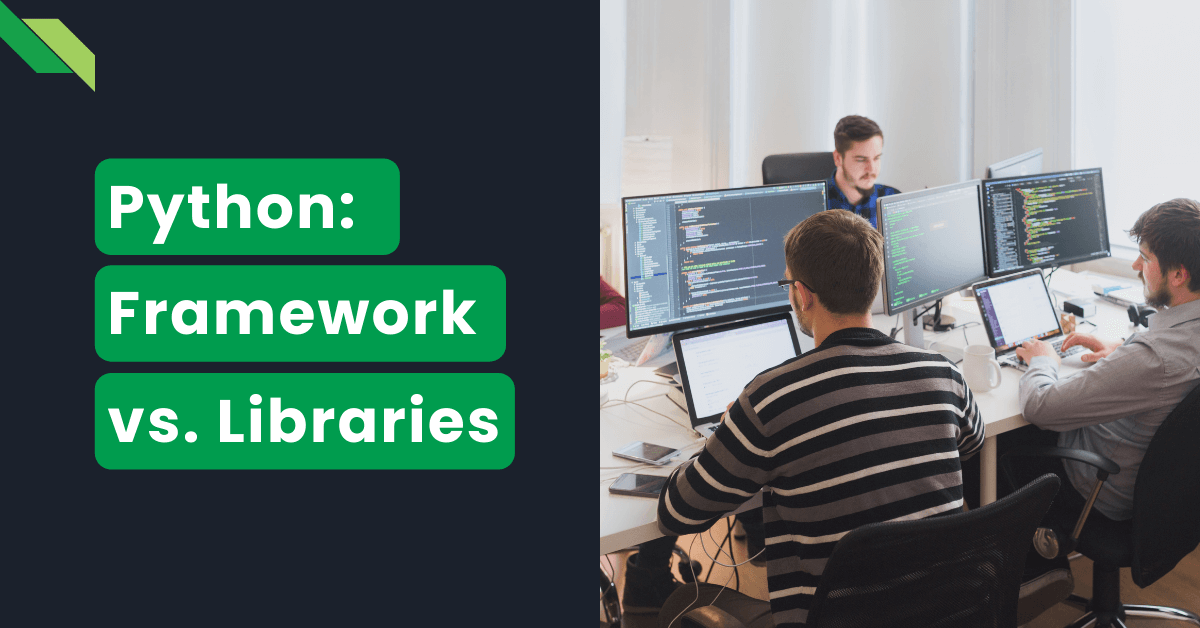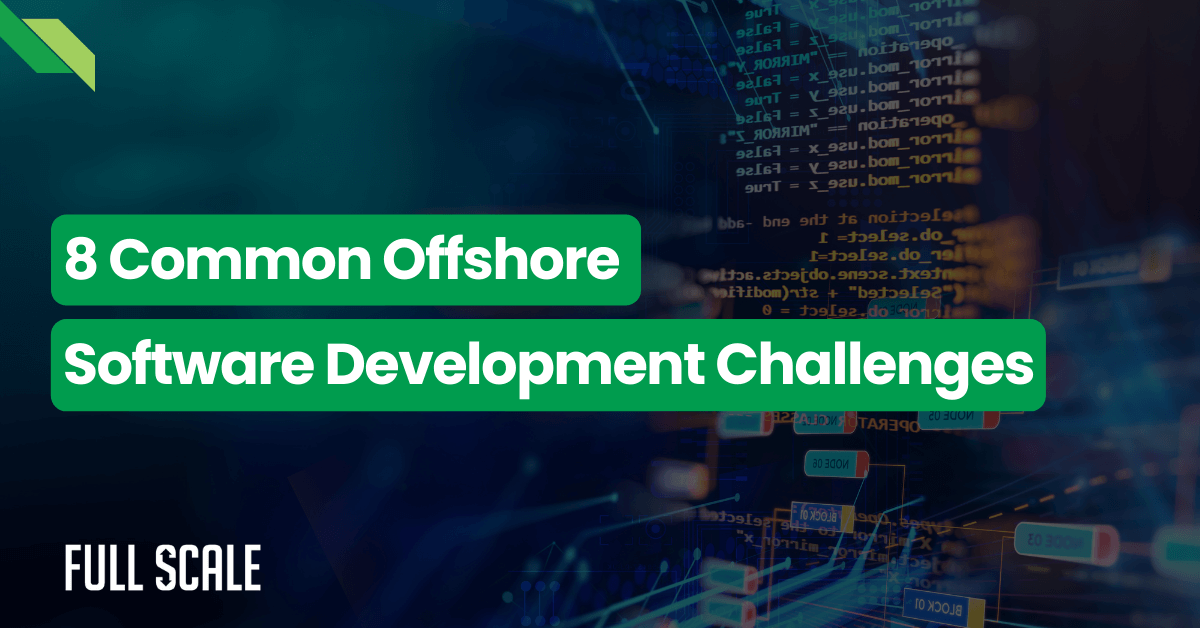Last Updated on 2025-07-28
Python frameworks help project owners fast-track their application’s time-to-market. In this entry, let’s answer the pressing need of startups to understand the difference between Python’s frameworks and libraries.
“Frameworks and libraries! What are frameworks and libraries?”
As a project owner(startup), this may be the question you ask when developers seek your thoughts on the best python frameworks or libraries to use. Now, before you panic and call a lifeline, think first. Maybe these questions will help you instead of adding a burden to software development.
First, let’s learn what frameworks are in Python. In general, all frameworks from different programming languages have the same functions―to fast-track development. Python frameworks are no different; they are a collection of modules and packages.
These frameworks automate common processes and implementation. For instance, developers can focus on application logic rather than dealing with routinary processes.
Related Video: Tips for Using Technology at Your Business
But what about libraries? Let’s explore further.
Python: Framework vs. Libraries
The major difference between frameworks and libraries is complexity. Libraries offer fewer complexities, and frameworks are the opposite. A library is a collection of packages that performs specific operations.
On the other hand, frameworks contain the basic flow and architecture of the application. But, developers need to build the rest of the functionalities.
Control is also a key difference between these two. When a developer calls a method from a library, the developer is in control of the development process. With frameworks, it is the one calling. It means that the frameworks call the processes, and the control lies in the framework.
However, frameworks are often used because of their key advantage―flexibility. They are extensible and provide the necessary tools to extend their features. Unlike libraries, developers need to learn each functionality to perform certain operations.
Top 5 Python Frameworks
Before getting into the top Python frameworks, let’s first look into the difference between a micro-framework and a full-stack framework.
- Micro-framework – These are simple and easy-to-use frameworks; they are a good choice for small- to medium-sized applications.
- Full-stack framework – It is used to make different applications; complex in nature and provides extensive libraries, data management, etc.
So, why do we need to know the difference between these two types of frameworks? The answer is simple. Python frameworks are categorized based on these classifications. This will help startup owners choose the best framework to use based on their project’s characteristics.
Django
Huge companies use Python and Django frameworks to save time and build better web applications with less coding. This full-stack framework is quite popular as it is a free and open-source framework. There is a growing number of developers and software experts that use it.
It includes all the necessary features by default. But noticeably excel on its DRY principle. Meaning, don’t repeat yourselves. Developers use Django with its Object Relational Mapper (ORM) to map objects to database tables. It is a code library that manipulates the data from a database using the object-oriented paradigm.
As one of the most popular Python frameworks, huge organizations use it to build robust applications.
- The Washington Post
- NASA
- Udemy
- YouTube
Flask
Flask is a micro-framework to build a solid web application foundation. It has individual components that developers can swap out. For an urgent software project, Flask is the number one choice. It has several unique features that eliminate trivial decisions and processes.
It works best for medium- to large-scale projects with its lightweight and modular design. Also, in cases where Django can’t cater to a web project, Flask is an efficient alternative.
Famous brand names using Flask includes:
- Netflix
- Lyft
- Airbnb
- Mailgun
Bottle
Here is another micro-framework from Python. It is built for APIs and implements single-source filing. Since it is a micro-framework, it has no dependencies aside from the Python Standard Library.
However, if you’re considering building a large application, then Bottle is not suitable for you. It works effectively with applications running most 500 lines of code with no additional requirements.
CherryPy
CherryPy is an open-source Python micro-framework. Its minimalist design builds Python web applications, and it’s just like building any other object-oriented project. Plus, CherryPy applications can run cross-platform. This means that any operating system that supports Python (Windows, macOS, Linux, etc.).
For startups, CherryPy is a great help as it has few limitations. It uses any type of technology for templating, data access, and so on. Most of all, it can handle sessions, statics, cookies, file uploads, and others. In terms of support, CherryPy has a community that assists both beginners and senior developers.
Web2Py
The last framework on the list is another full-stack framework, the Web2Py. Developers and data scientists like this framework for its capability to handle data. If your project is more into data gathering and analysis, then this framework is for you.
Top 5 Python Libraries
TensorFlow
It’s from a series of tensor operations, thus the name. It works like a computational library for writing new algorithms involving large numbers of tensor operations. This library is suitable for projects dealing with neural networks, as it works well with computational graphs.
TensorFlow library is perfect when working with Python applications focusing on machine learning. It is an open-source library built by Google in partnership with Brain Team. Therefore, TensorFlow is present in almost every Google application for machine learning.
Scikit-Learn
Sci-kit Learn library works with Python applications focusing on machine learning. This library is ideal when working with various methods to check the accuracy of supervised models on unseen data.
Also, it provides an efficient approach to clustering, factor analysis, and principal component analysis for unsupervised neural networks. Lastly, it works well with image processing, like extracting features from images and texts.
Numpy
A library using another library? TensorFlow and a few other libraries use Numpy as their internal library to perform multiple operations. As Python programming language deals with applications about data, Numpy helps developers with its complexities.
And the good thing about Numpy is its interactive and easy-to-use features. It makes complex mathematical implementations very simple. If your project is into data science and machine learning, a background in Numpy can greatly benefit you.
Keras
Keras is a machine learning library in Python. It works well and provides a smooth mechanism to express neural networks. It also provides the best utilities for compiling models, data-set processing, graph visualization, and others.
Do you find it difficult to understand how Keras works? Simply, it works around in the backend development of your Python application. Take a look at Netflix, Uber, and Instacart to appreciate its use. Also, it is sought-after among startups working with deep learning as the core concept of their products.
PyTorch
PyTorch works well with neural networks. It is one of the largest machine learning libraries that allows developers to perform tensor computations. If you are interested in Natural Language Processing (NLP), then PyTorch Library can help you.
Facebook developed this library under its AI research group, and Uber used it with its “Pyro” software for probabilistic programming. Since its inception, the library has grown in popularity and attracted an increasing number of machine learning developers.
Hire Python Developers
With the number of choices, this could be a difficult task. But, keep in mind that popular Python frameworks solve different problems and make tradeoffs. Also, it serves different niches and audiences.
At Full Scale, we can help you evaluate these frameworks by answering these questions:
- What are the software type, size, and complexity of your project?
- What is your time frame to develop and deploy your application?
- Is this a long-term application, and how many developers do you need to work on it?
- Do you prefer to choose your frameworks, libraries, and application structure or a curated set of options selected for you in advance?
- Do you consider the quality of community support and documentation of your potential choice?
Bear these considerations as you explore your options. At Full Scale, we have a pool of Python developers that can help you regardless of your project’s complexity.
Do you want a framework and a software provider that is likely to grow with you? Then, we are a good fit for your application both now and in the future. Talk to us!

Matt Watson is a serial tech entrepreneur who has started four companies and had a nine-figure exit. He was the founder and CTO of VinSolutions, the #1 CRM software used in today’s automotive industry. He has over twenty years of experience working as a tech CTO and building cutting-edge SaaS solutions.
As the CEO of Full Scale, he has helped over 100 tech companies build their software services and development teams. Full Scale specializes in helping tech companies grow by augmenting their in-house teams with software development talent from the Philippines.
Matt hosts Startup Hustle, a top podcast about entrepreneurship with over 6 million downloads. He has a wealth of knowledge about startups and business from his personal experience and from interviewing hundreds of other entrepreneurs.




